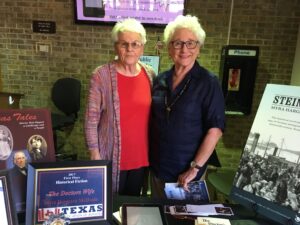Born into slavery in Arkansas in 1845, Nelson Taylor Denson moved, at age eleven, to Falls County in East Texas with his master. Denson, who had been educated by his master, developed high regard for Sam Houston after hearing Houston speak when he visited Marlin in his campaign for governor. During the Civil War, Denson accompanied his master in the Confederate Army, serving as a saddle boy looking after the horses.
An account titled Slaves Narratives—Rural NW Louisiana African American Genealogy includes Denson’s account of the Civil War in which he praises Sam Houston for standing by his principles and refusing to take an oath of loyalty to the Confederacy, which resulted in Governor Houston being removed from office. Denson says he that at age sixteen he went to war as his master’s “bodyguard.” In his gripping account of the night before the Battle at Mansfield on the Sabine River, he describes the sound of whippoorwills calling and the low mummer of the men singing spirituals and listing for an attack from the Yankees camped just across the river.
Denson views the slaves who ran away and joined the Union forces as not properly caring for the women and children left behind on the plantations. He goes on to share his concern after the war for the change in the “old order,” and the decline in virtue and chivalry.
After the Civil War, Denson returned to Falls County as a free man and began working to fulfill his two dreams—to preach and to teach. Incorporating a deep understanding of human needs and rights, Denson became a circuit preacher in the Baptist denomination.
On November 8, 1868, the Reverend Denson, his wife, and eleven other blacks organized the Marlin Missionary Baptist Church, the first black congregation in Falls County. Denson believed that black citizens must have the basic rudiments of education, which led him to teach the fundamental skills of reading, writing, and arithmetic. He helped start a school sponsored by the Marlin Missionary Baptist Church, and others soon followed. By the mid-1880s Denson won election as county commissioner, becoming the first black official in the county. His good judgment and spirit of cooperation won the respect of both the black and the white communities, and he continued to be respected and called on for advice and counsel until his death in 1938 at the age of ninety-three.
The Rev. Nelson T. Denson and the Marlin Missionary Baptist Church historical marker is located at 507 Bennett at George Street in Marlin, Falls County.on

I like that he recognized the decline in our culture after the war. I always appreciate black people who speak truth rather than parroting the lines they’re supposed to say.
He was one of the fortunate slaves who received an education, which made all the difference for him after the war.
Hi Myra, I just finished doing some research on women after the civil war which most of them considered a BIG betrayal. It wasn’t supposed to last as long as it did, and they never expected to have to run the homefront especially after their men returned–broken and missing limbs. Rev. Denson sounds wise beyond earthly bounds in his foresight and grace. Thanks for sharing.
Thanks, Barb. Your research sounds interesting. I’m working on another Texas historic fiction that begins in 1875 as the politics are changing in Texas back to Democratic rule. I’m struggling with the clashing culture–how do I make it real?!
There’s a many-paged pamphlet I was given at the West Columbia Museum outlining the history of the plantations along the lower Brazos. The man who wrote it clearly was waiting for the South to rise again, but he also told stories of some of the slaves and former slaves who seem to have exhibited some of the same dignity and personableness as Rev. Denson. Education does make a difference.
I am reading Edward Ball’s SLAVES IN THE FAMILY, an award-winning account of his slave-owning family that stretches back to South Carolina in 1690s. Ball is determined to contact descendants of the slaves and in some cases the slave owners. He is honest about the treatment and the dignity of the literally hundreds of slaves that were owned by the Ball family.